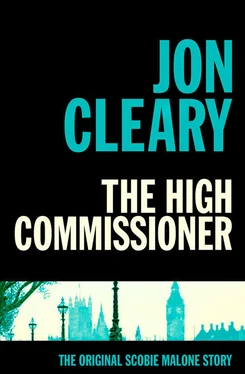Jon Cleary - The High Commissioner
Здесь есть возможность читать онлайн «Jon Cleary - The High Commissioner» — ознакомительный отрывок электронной книги совершенно бесплатно, а после прочтения отрывка купить полную версию. В некоторых случаях можно слушать аудио, скачать через торрент в формате fb2 и присутствует краткое содержание. Жанр: unrecognised, на английском языке. Описание произведения, (предисловие) а так же отзывы посетителей доступны на портале библиотеки ЛибКат.
- Название:The High Commissioner
- Автор:
- Жанр:
- Год:неизвестен
- ISBN:нет данных
- Рейтинг книги:3 / 5. Голосов: 1
-
Избранное:Добавить в избранное
- Отзывы:
-
Ваша оценка:
- 60
- 1
- 2
- 3
- 4
- 5
The High Commissioner: краткое содержание, описание и аннотация
Предлагаем к чтению аннотацию, описание, краткое содержание или предисловие (зависит от того, что написал сам автор книги «The High Commissioner»). Если вы не нашли необходимую информацию о книге — напишите в комментариях, мы постараемся отыскать её.
The High Commissioner — читать онлайн ознакомительный отрывок
Ниже представлен текст книги, разбитый по страницам. Система сохранения места последней прочитанной страницы, позволяет с удобством читать онлайн бесплатно книгу «The High Commissioner», без необходимости каждый раз заново искать на чём Вы остановились. Поставьте закладку, и сможете в любой момент перейти на страницу, на которой закончили чтение.
Интервал:
Закладка:
“I guess so,” said Malone, and wondered where Quentin thought of his roots as being planted. Tumbarumba, Sydney, Perth, Canberra, London: the man had been on the run all his life.
Then a thin elderly woman, throttled by pearls, was squeezed out of the crowd like a magician’s trick. She greeted Lisa with a hoarse whinny.
“Lady Porthleven, may I present Mr. Malone?”
“Pleased to meet you,” said Malone.
“Oh, really?” Lady Porthleven looked surprised: no one had ever actually told her he was pleased to meet her. Then she drew Lisa back into the crowd with her, leaving Malone well aware of the fact that he was on the outside.
He looked about the room. Jewels glittered like angry eyes; decorations were bleeding wounds on breasts. A Pakistani and a Bolivian went by, continents arm in arm; Italy flirted with Iran, and an international bed was already beginning to bounce. A string quartet was playing somewhere in an alcove, working its laboured way through a medley: even the requests at the Grand at Brighton had never been as demanding as this. The colours of the women’s gowns, Western, Eastern, African, both pleased and pained the eye: Malone felt the effects of visual gluttony. He stood irresolute for a moment, suddenly tired, wanting to shout at the crowd to go to hell: no wonder Australians disliked bloody foreigners. Then he grinned and shook his head. He was an outsider here. He was discovering for the first time what it was like to be a foreigner.
“Don’t get too involved over there,” Leeds had said on the phone when the call had come through. “I’ll see what Flannery says about the extra time Quentin has asked for. I’ll try and talk him into it. But don’t forget, Scobie – you’re a policeman on duty for all those extra days.”
“I know, sir. Polite but impersonal.”
“That’s the ticket. I’ll call you back in four hours’ time, let you know the score. Where will you be staying?” Malone had put his hand over the phone and repeated the question to Quentin. Then he had said, “Mr. Quentin says I can stay here at his house. They have several guest rooms.”
“Don’t be a guest, Scobie. Or anyway, don’t act like one. But I guess you’ll have to stay there to keep an eye on him. I’ll ring you. This is getting to be a bigger bastard of a situation all the time.”
Then Malone had followed Quentin upstairs, where Joseph the butler had taken him over. “This is your room, sir. Some very distinguished gentlemen have stayed here.”
Malone had glanced about the room: even here he was in the midst of discreet elegance. It was a room designed for a male guest: antique pistols hung on one wall, the chair and the dressing-table accessories were leather-backed, even the air smelled as if it had been sprayed with some masculine air freshener. Only the carpet had a feminine luxury about it: Malone felt bogged down in its deep soft pile. An overnight room for the rich and the distinguished: Malone remembered some of the closets with bed in which he had slept when sent to country towns on a case.
“The tone will be lowered tonight,” Malone had said, but Joseph had said nothing: one didn’t joke about a self-evident truth.
When he was dressed Malone had looked at himself in the long mirror and been impressed by what he saw. The coat was a little tight under the arms, but otherwise everything might have been tailored for him. Even the shoes had fitted, but he had felt a momentary doubt when pulling them on: was this how you felt when stepping into a dead man’s shoes?
He had gone downstairs and Quentin, his wife and Lisa Pretorious had been waiting in the hall for him.
“You look most distinguished, Mr. Malone,” Sheila Quentin had said, and Malone had felt a youthful glow of pleasure: he had never expected in all his life to be called distinguished.
He looked at Joseph, standing nearby, and winked; but the butler had not moved a muscle. I should arrest that bastard , Malone thought, for insulting a police officer . Then he had glanced at Quentin and the humour in him had been doused. The High Commissioner, handsome and distinguished though he was, looked exhausted, a man who had all at once begun to age. Looking at the tall grey-haired man in the beautifully cut dress suit, Malone felt he was looking at a corpse dressed for a wedding instead of a funeral: someone had got the dates wrong.
“Would you be kind enough to escort Miss Pretorious?” Sheila Quentin had said; and Malone had offered his arm to the cool lovely blonde who was looking at him with new, almost unbelieving, interest.
“If you’ll have me,” he said, as the Quentins had gone ahead of them out the front door to the waiting car.
“I wonder that Tumbarumba ever let you go,” Lisa had said. He looked quickly in front to see if the Quentins had heard the remark, but if they had neither of them showed any reaction. “I wouldn’t have recognised you as the man I let in a while ago.”
Her smile had taken the ice out of her remark. But she knows I’m an outsider , Malone had thought.
Now here at the reception he felt even more of an outsider. Then through an open arch he saw a waiter go past bearing a tray of food; his stomach reminded him he had not eaten for almost nine hours. He followed the waiter, easing his way through the groups of people with more politeness than he felt. He knew it was stupid to feel resentful because people didn’t turn and welcome him with open arms. But he had been spoiled back in Sydney: there, even the crims had been friendly to him. Except when he came to arrest them.
The supper room was almost deserted but for a few disguised journalists pecking at the perks of the diplomatic social round, and two Negro men in evening dress.
“Enjoying yourself?” The older of the two men, tall and portly and cheerful, had a voice as rich as that of Quentin’s butler; but he had none of the servant’s snobbery, he was a man born to be friendly.
“Not much,” said Malone with undiplomatic truthfulness; hunger always sharpened one’s candour. Then he remembered that he was in an African embassy, that the men beside him were coloured. “Do you belong here?”
“I’m the ambassador. I’m not enjoying it, either.” He laughed, a deep gurgle of merriment that made jelly of his jowls. The younger Negro, lighter skinned and thinner, smiled with more controlled humour. The ambassador was piling a plate with food; he held a bouquet of crab, salad, tomato, celery. “But the food is good. Help yourself. Where are you from?”
“Australia,” said Malone, and saw the younger Negro look at him with sudden interest.
“With Quentin? A splendid chap. I can even forgive him your White Australia policy. He’ll be the one to make a success of this conference.” He added a ribbon of mayonnaise to the bouquet in his hand. “If it’s going to be a success.”
“You don’t think it will be?” Malone followed him round the table, using the ambassador’s plate as his own example: if a diplomat could be a hog, why not a plain policeman?
“Champagne? The wages of sin and diplomacy, Bollinger ’55. Back in my country I’m expected to drink a concoction made out of tropical fruits. We call it Château-neuf-du-Papaya. Terrible stuff.”
“Jungle juice,” said the younger Negro in a soft American accent. “The Aussies used to make it and sell it to our guys in New Guinea.”
“Really? I’m surprised you won the war. Well, now I have to find somewhere quiet to eat this.” The ambassador looked at the heaped plate, then winked a piebald eye at them both. “My father died of gluttony, a surfeit of underdone missionary. What a pity he didn’t live to appreciate the fruits of independence.”
He went rolling out of the room, chuckling to himself. Malone grinned and the younger Negro said, “His father went to Oxford just as he did. Periodically he takes a course in atavism, to come down to the level of some of his politicians back home.”
Читать дальшеИнтервал:
Закладка:
Похожие книги на «The High Commissioner»
Представляем Вашему вниманию похожие книги на «The High Commissioner» списком для выбора. Мы отобрали схожую по названию и смыслу литературу в надежде предоставить читателям больше вариантов отыскать новые, интересные, ещё непрочитанные произведения.
Обсуждение, отзывы о книге «The High Commissioner» и просто собственные мнения читателей. Оставьте ваши комментарии, напишите, что Вы думаете о произведении, его смысле или главных героях. Укажите что конкретно понравилось, а что нет, и почему Вы так считаете.












